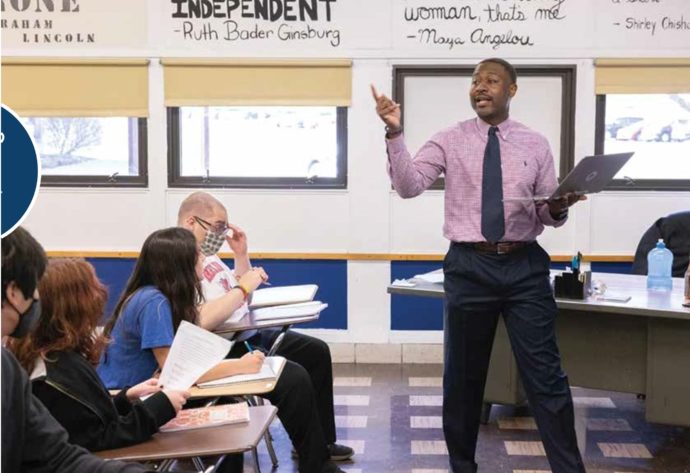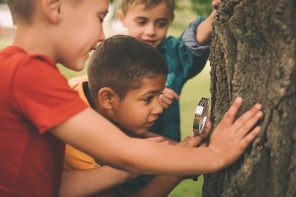“When I was growing up my mother told a story that when she was in high school she marched with Martin Luther King Jr.,” said Russell, a history teacher at Oberlin High School in Oberlin, Ohio. “From there, I always had an interest in what I consider unknown stories. I love talking to people about their story.”
He also vividly remembers his kindergarten teacher reading a book to the class about the legendary civil rights leader. “I was just fascinated with stories,” Russell said. “And I decided to become a history teacher from that. History is nothing but stories.”
That love for storytelling fueled a fire in Russell, the 2022 National Teacher of the Year. His passion for the past and lessons learned from it is passed along to the teenagers he encounters in the classroom every day- at the same school from which he graduated.
“Kurt’s extensive career shows the power of educators to shape the lives of students from the classroom to extracurricular activities to the basketball court,” said Carissa Moffat Chief Executive Officer of Council of Chief State School Officers, that has run the National Teacher of the Year Program for over 70 years.
Every year, a National Teacher of the Year is chosen by a selection committee composed of 17 education organizations and individuals, including National PTA President, Anna King, this year. The selection committee said in a statement: “Kurt is a powerful advocate who always puts students at the center of his work. With more than two decades in the classroom and strong connections to his community, he speaks with warmth and honesty on how schools can best meet students’ needs.”
Community is Key
Francine Toss, the kindergarten teacher who inspired Russell as a child and in later years, says she is not surprised that her engaged and eager former student has received the notable honor of National Teacher of the year.
“He is so respected by families throughout our community,” said Toss, who retired in 2021 after a 49-year career in Oberlin schools. “His work with students is legend. His approach to teaching appears to be truly in touch with the youth of today.”
The opportunity to stand before young people in the classroom at his beloved Oberlin High is not lost on Russell. “It’s a thrill and it’s so impactful for me,” he said. “It has shaped my teaching. I remember the days in which I was bored in school and those were the days that I didn’t see myself in the lesson. And I try to remember that.”
Russell’s long-time ties to the community enables him to instantly connect with many students because as a native son, he often knows someone in their family. In fact, you could say he is one of them
Bringing History to Life
Russell, the youngest of three sons of a construction worker and a teacher’s aide, is an animated and enthusiastic presence in the classroom. A graduate of the College of Wooster, where he earned a bachelor’s degree in history, Russell also holds a master’s degree in curriculum and instruction from Ashland University.
While he says he is not a born teacher, he was shaped and molded to be one thanks to influential role models he had while growing up. One of them was Russell’s eighth-grade math teacher, Larry Thomas, who included stories about women and Black mathematicians in his lesson plans. Russell took a cue from Thomas on how to incorporate diverse representation into a curriculum.
“I want to make sure that students can see themselves in the lessons,” he said. For him, that means helping young girls see themselves in the Revolutionary War or encouraging teens to put themselves in the civil rights movement to truly understand what was going on during that time.
Russell also said he always asks questions to give students an opportunity to think and lend their voice. “I don’t want to lecture or be a teacher who tells. I want to be a teacher who opens up the classroom for other voices to be shared.” He believes that every student and voice should be valued.
Russell particularly enjoys teaching about the Reconstruction period of U.S. history. “It’s so engaging for my students as we connect Reconstruction to our current time,” he said. “It’s my belief that our country is really based upon that time period, and how we developed as a country.” Great conversations have emerged, Russell said. “Kids want to talk about it, and they are so fascinated by it. Bringing up race and healing and what we can do to move forward is so inspiring.”
‘We Grow by Being Uncomfortable’
In addition to U.S. history, Russell teaches African American history and a course he developed called Race, Gender and Oppression, which is a popular elective. He has been known to tell his students to “confront the uncomfortable” and deliberately includes stories within history that are uncomfortable for some, such as those about the women’s rights movement, race and slavery. It serves no one to shy away from difficult topics, he says, so he finds ways to openly discuss them.
How does he do it? Russell employs a teaching technique called “Crossing the Line.” Several times during the week at the beginning of class, he poses questions to students that deal with a controversial topic. For instance, while studying World War I and looking at immigration, he asked the class if borders should be closed at wartime. Students can stand and state their views and hear others’ perspectives. It also gives him the chance to occasionally deviate from the lesson plan and allow discussions to flow organically.
“We have to listen,” Russell said, adding that differing views are not personal attacks. “We grow by being uncomfortable. If you are uncomfortable with everything you’re doing, you’ll never grow. Feeling uncomfortable is not a bad thing.”
During his year of traveling across the nation as National Teacher of the Year, Russell wants to amplify the need for diversity not only within the faculty ranks (only 2% of teachers are Black men, he says), but also in school curricula. He is an advocate for inclusivity in studies to go beyond race and ethnicity to also embrace different religions and sexual orientations.
The married father of two sons also finds time to engage with students outside of the classroom. He serves as faculty adviser for the Black Student Union and is the head coach for the school’s varsity basketball team.
So, who in history would Russell like to meet if he could? You guessed it: Martin Luther King Jr., the man who he first heard memorable stories about at home and at school.
“I would love to ask him, ‘How did you show so much love and grace during a time where you felt you were not seen, or Black people were not seen?’ I can connect that to teachers. Sometimes I feel that teachers are not heard, seen or respected,” he says.
Yet that doesn’t discourage Russell. The students are his inspiration. “I see hope in my students, I see brilliance. And they deserve my best. They’re the reason I’m excited to be in the classroom.”





